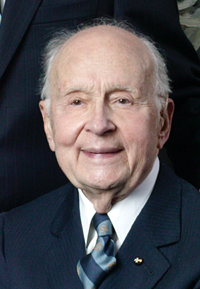 Patients of Hopkins physicians GEORGE T. NAGER, M.D., and John Niparko, M.D., the inaugural chairholder, supported the creation of this professorship. Dr. Nager was considered one of the world’s leading otological surgeons and otopathologists, as well as an outstanding teacher, mentor, and clinician. Among his many honors was inclusion in the American Otological Society, which restricts membership to 100 living individuals, and in the Collegium, which permits only 20 American members. Dr. Nager came to Hopkins as a fellow and joined the faculty in 1954. In 1969, he was named director of the Division of Otology and Laryngology, which the following year became the Department of Otolaryngology-Head and Neck Surgery. He stepped down as chairman in 1984. Dr. Nager reorganized the Temporal Bone Pathology Laboratory, which under his leadership gained an international reputation. His publications on tumors and bone diseases involving the ear have become classic references. In 2001 he was named a Distinguished Service Professor. Dr. Nager died in 2010.
Patients of Hopkins physicians GEORGE T. NAGER, M.D., and John Niparko, M.D., the inaugural chairholder, supported the creation of this professorship. Dr. Nager was considered one of the world’s leading otological surgeons and otopathologists, as well as an outstanding teacher, mentor, and clinician. Among his many honors was inclusion in the American Otological Society, which restricts membership to 100 living individuals, and in the Collegium, which permits only 20 American members. Dr. Nager came to Hopkins as a fellow and joined the faculty in 1954. In 1969, he was named director of the Division of Otology and Laryngology, which the following year became the Department of Otolaryngology-Head and Neck Surgery. He stepped down as chairman in 1984. Dr. Nager reorganized the Temporal Bone Pathology Laboratory, which under his leadership gained an international reputation. His publications on tumors and bone diseases involving the ear have become classic references. In 2001 he was named a Distinguished Service Professor. Dr. Nager died in 2010.
George T. Nager, M.D., Professorship in Otolaryngology-Head and Neck Surgery
School of Medicine
Established in 2003 in honor of George T. Nager with commitments made beginning in 1994 by Hopkins patients including Sigrid T. Cerf and her husband, Vinton
Held by Elisabeth Glowatzki
 DR. ELISABETH GLOWATZKI is the George T. Nager, M.D., Professor and Associate Vice Director of Research in the Department of Otolaryngology-Head and Neck Surgery. In 2015, she became the first female Professor in the Department. She also holds a joint appointment in the Department of Neuroscience. She received her doctoral degree from the University of Kaiserslautern, Germany, and did postdoctoral fellowships in Tuebingen, Germany, and with Dr. Paul Fuchs at Johns Hopkins’ Department of Otolaryngology-Head and Neck Surgery. At this early stage of her career, Dr. Glowatzki’s work with Dr. Fuchs already gained international visibility for her seminal work on mechanisms of synaptic transmission in the mammalian inner ear, up until then uncharted territory (Glowatzki and Fuchs, Science 2000; Nature Neuroscience 2002).
DR. ELISABETH GLOWATZKI is the George T. Nager, M.D., Professor and Associate Vice Director of Research in the Department of Otolaryngology-Head and Neck Surgery. In 2015, she became the first female Professor in the Department. She also holds a joint appointment in the Department of Neuroscience. She received her doctoral degree from the University of Kaiserslautern, Germany, and did postdoctoral fellowships in Tuebingen, Germany, and with Dr. Paul Fuchs at Johns Hopkins’ Department of Otolaryngology-Head and Neck Surgery. At this early stage of her career, Dr. Glowatzki’s work with Dr. Fuchs already gained international visibility for her seminal work on mechanisms of synaptic transmission in the mammalian inner ear, up until then uncharted territory (Glowatzki and Fuchs, Science 2000; Nature Neuroscience 2002).
For more than two decades, Dr. Glowatzki has been an international leader in her field. Since 2004, Dr. Glowatzki’s laboratory at Johns Hopkins has been continuously R01-funded. Her research has provided an in depth analysis of mechanisms of synaptic transmission, crucial for the coding of the sound signal in the inner ear. Weisz, Glowatzki and Fuchs were the first to report intracellular recordings from a subset of cochlear afferent neurons that may serve as acoustic pain sensors of the inner ear (Nature, 2009). In 2010, Dr. Glowatzki extended her research interests to investigate cellular mechanisms of synaptic transmission in the vestibular endorgans, which sense head position and movement in space (Sadeghi et al., J. Neurosci. 2014). Lately she also studies noise-induced damage, synapse loss (Wu et al. elife, 2020) and regeneration in the inner ear (Vincent et al., in progress). The ultimate goal of her studies is to find approaches to prevent or cure hearing loss and vestibular disorders.
In addition to her impactful work in research, Dr. Glowatzki is a dedicated educator and mentor. Her excellent mentorship is reflected in the success of her graduate students and postdoctoral fellows; most have received one or multiple grants while in her laboratory, and many have successfully secured independent academic positions in the United States and abroad.